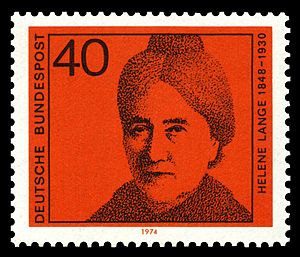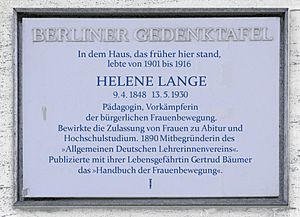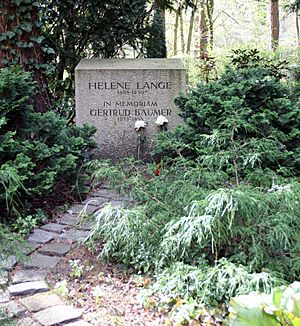Helene Lange facts for kids
Helene Lange (born April 9, 1848, in Oldenburg; died May 13, 1930, in Berlin) was an important German teacher and a leader in the women's rights movement. She worked hard to improve education for girls and women. Helene Lange is seen as a key figure in the fight for women's civil rights in Germany and around the world. She was even a member of the Hamburg Parliament from 1919 to 1921. In 1928, she received a special award from Prussia for her great work.
Contents
Early Life and Becoming a Teacher
Helene Lange grew up in Oldenburg, Germany. Her father was a merchant, and her mother's name was Johanne. Sadly, her mother died when Helene was only six years old. Her father passed away ten years later. This meant Helene had a legal guardian for a year.
Helene really wanted to become a teacher. Her guardian didn't fully support this wish. So, in 1866, she took a job as an au pair at a boarding school in Alsace. There, she taught German and was able to take part in teaching courses. She also studied a lot on her own, learning about philosophy, history, and languages. In 1867, she worked as a governess for a wealthy family in Osnabrück.
In 1871, Helene moved to Berlin to prepare for her teacher's exam. She passed it and began working as a private tutor in 1872. Right away, she started working to help women and girls get better education. She joined the Association of German Women Teachers and Tutors. From 1874, Helene taught languages at a girls' high school near Berlin. Between 1876 and 1891, she taught and directed a special class for women teachers at a private women's college in Berlin. She even started a new training program for women teachers there.
Fighting for Better Education for Girls
Helene Lange believed that women should teach girls. She felt women could understand girls better. In 1887, she and other women sent a request to the Prussian Ministry of Education. They asked for more women teachers in public high schools for girls. They also wanted better scientific training for women teachers. However, their request was turned down.
Helene explained her ideas in a magazine called the Yellow Pamphlet. She wrote that girls should be taught by women. She pointed out that at that time, most teaching jobs were held by men.
Leading the Women's Movement
In 1889, Helene Lange started special courses for women in Berlin. These courses helped women prepare for middle and high school. In 1890, she created the General German Women Teachers Association. This group worked to protect the interests of female teachers, and Helene led it.
Helene also started a magazine called Die Frau (The Woman) in 1893. This magazine became very important for the German women's civil rights movement. In the same year, Helene helped found the General German Women's Association.
In 1894, Helene Lange became a board member of the Federation of German Women's Associations. This was a big organization that brought many German women's groups together. However, some groups, like the Social Democratic women's groups, did not join. They felt the Federation did not support their social and political goals.
From 1898, Helene Lange worked closely with Gertrud Bäumer, another important German feminist and politician. Helene's eyesight was getting worse, so Gertrud helped her a lot.
In 1906, Helene Lange became an advisor to the Prussian Cultural Administration. Her work helped lead to important reforms in girls' schools in Prussia in 1908.
After 1908, women were finally allowed to join political parties in Prussia. Helene Lange joined the Free-minded Union, a left-liberal party. During World War I (1914–1918), Helene supported the National Women's Service. This group helped organize women to support the war effort. From 1917 to 1920, Helene and Gertrud Bäumer lived in Hamburg. There, Helene founded the Social Women's School and worked as a teacher.
Later Life and Recognition
In 1919, women in Germany finally gained the right to vote and to be elected to office. Helene Lange was elected to the Hamburg Parliament for the German Democratic Party (DDP). She opened the first meeting of the parliament as its oldest member.
In 1920, Helene and Gertrud Bäumer moved back to Berlin. Helene slowly stepped back from her association work. However, she continued to write and publish her ideas. In 1923, she received an honorary doctorate degree in political science from the University of Tübingen. In 1928, Helene Lange was honored with the Grand Prussian State Medal for her great service to the state.
Images for kids
See also
 In Spanish: Helena Lange para niños
In Spanish: Helena Lange para niños





